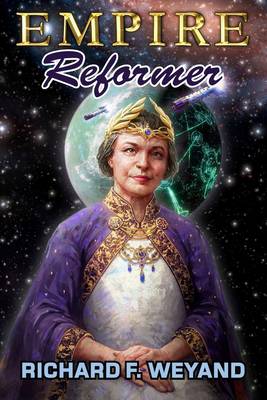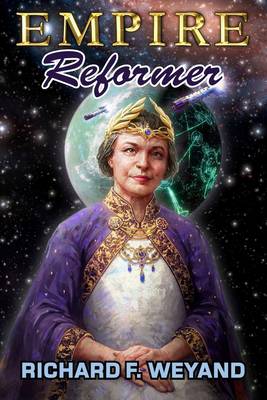
- Retrait gratuit dans votre magasin Club
- 7.000.000 titres dans notre catalogue
- Payer en toute sécurité
- Toujours un magasin près de chez vous
- Retrait gratuit dans votre magasin Club
- 7.000.0000 titres dans notre catalogue
- Payer en toute sécurité
- Toujours un magasin près de chez vous
Description
Ruling over the vast bureaucracy of the Sintaran Empire is the Imperial Council. It's only check: The Empress, whose every decree is binding law. The corruption of the bureaucracy has reached staggering proportions when a true reformer ascends to the Throne. She has a long-term plan to reform the Empire. But can the new Empress and her young allies succeed? And at what cost? AN INTERVIEW WITH RICH WEYAND Is EMPIRE part of the Childers Universe, or a completely new series? EMPIRE is a completely new series. I wrote myself out of a job in Childers. Jan Childers solves the interstellar war problem, so life gets much less interesting from a novelist's point of view. The Childers books start a few hundred years in the future, and span about three hundred years. EMPIRE is likely a thousand years or so in the future, and spans only about thirty years across all five planned books. What are the core technologies underlying the science in EMPIRE? Fully immersive virtual reality is here. I think direct neural VR is virtually a certainty. Hyperspace is here as well, although it works differently than in the Childers Universe. I need hyperspace to have interstellar travel while not violating normal-space physics, but it's only a one-layer hyperspace, not the multi-layered hyperspace of Childers. Finally, EMPIRE has quantum-entanglement radios, which allows something like the Web across the entire EMPIRE. Real-time connectivity. So you can stream video across light years in real time. Are you doing something new here with plotting? Yes. Childers grew organically. I didn't have five books in mind at the start. I didn't even know if Childers was going to be novel-length. I just started writing. Each book in the series was planned after the last book was done. For EMPIRE, I had a five-book story arc laid out before I started this first book. So what's the grand scheme? Well, without getting into spoilers, the five-book arc is the story of Robert Allan Dunham. I can't say any more without major spoilers. This first book is the story of how Bobby Dunham, his sister Dee, and their friends grow up and ally with the Empress to reform a hugely corrupt Imperial bureaucracy. The cover blurb says the Empire is 150,000 planets and 300 trillion human beings. That's a huge scale. Yes, but it's still a human story. If you had told someone in 1000 AD that in 2000 AD there would be cities with twenty million people in them, countries with over a billion people, and seven billion people on Earth, they would have thought you were crazy. Even Rome at the height of its power had a population of barely a million. So there are lots of planets, and lots of people, but the human story is still about what does this person do, how does this person's life unfold, against this bigger backdrop. How did EMPIRE write? Was it fast? EMPIRE: Reformer is 88000 words and took 44 days to write, so about 2000 words a day. That includes non-writing days. I take off one day a week even in mid-novel, and sometimes I have to take a day off to rake leaves or something. I usually write about 2500 words per writing day, and that maintained through this book. What about the cover? That's a departure for you. For the Childers books, I used photography of real people. I have seen a lot of book covers that were artwork, and the characters often just weren't real to me. They weren't human, but more like a detailed cartoon. Lifeless. But I found a wonderful artist on-line, Aaron Griffin in England. Even very raw sketches from him catch the humanity of his subject, like a pencil drawing could just start talking to you. They're alive. He's a terrific young talent, and I contracted with him for the five-book series.
Spécifications
Parties prenantes
- Auteur(s) :
- Editeur:
Contenu
- Nombre de pages :
- 356
- Langue:
- Anglais
- Collection :
- Tome:
- n° 1
Caractéristiques
- EAN:
- 9781732128040
- Date de parution :
- 17-12-18
- Format:
- Livre broché
- Format numérique:
- Trade paperback (VS)
- Dimensions :
- 152 mm x 229 mm
- Poids :
- 476 g

Les avis
Nous publions uniquement les avis qui respectent les conditions requises. Consultez nos conditions pour les avis.






